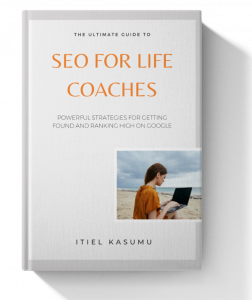Having a website for your life coaching business is more than having something online to show people when talking about what you do.
Your life coach website should attract your ideal clients online, it should connect with them, and it should make it easy for them to work with you.
That being said, what should you look out for when building a website for your life coaching business to make it effective? How exactly do you build a website that attracts your ideal clients?
In this post, I’ll talk about 8 important things you need to have on your coaching website to make it work for you.
Important Things To Have On A Life Coach Website
1. Your Personal Touch
Your website is NOT all about your potential clients.
Don’t get me wrong, you should keep your ideal clients in mind when doing anything on your website(and when marketing entirely).
But that’s not everything. You should keep YOU in mind too.
Though people care A LOT about their problems, they also want to connect with you.
They want to know if you’re a real human, if you can relate with them, and if you can solve their problem.
So be authentic. Have more of your real images on your website than stock photos.
Tell your story. Open up, and you’ll attract the right people.
2. A Unique Selling Proposition
Your Unique Selling Proposition/Unique Selling Point(USP) is what makes you different from other life coaches. What your life coaching business stands for.
People’s attention span is becoming shorter. This means you want to get visitors hooked as soon as they land on your website.
Most coaches make the mistake of having a very ambiguous unique selling proposition dressed with buzz words.
Be clear on what your unique offering is and talk about it everywhere on your website.
An example of an ambiguous USP is:
I Help People Get Results. Not OK or Average. Great! No Woo-woo, No BS.
I saw this on a life coach website when researching life coaches in the UK.
The USP of this coach is very confusing and generic.
What great result? Yes, you help people but saying “people” is like talking to everyone on earth. Who exactly do you help?
A good example of a clear USP is:
I Help 40+ successful professional men and women to achieve balance, regain control and live the life they choose
See how this clearly states who the coach works with, what she helps them with, and the value in her work.
3. The Results Your Potential Clients Should Expect
People pay for a plan. They want to know the results to expect when they work with you, and not the process.
So don’t just list your services or state them in a way that potential clients won’t understand.
Instead, when describing what you do, describe it in form of results.
Be direct and clear on who you serve.
Clearly state the problem you’ll help your ideal clients solve, and how their life will be better after working with you.
4. A Clear Call-to-Action Here and There
A good life coach website backed with great website content can quickly go wrong without a clear call to action.
Yes, visitors have read your website content and they have hunches that you might actually be able to help them, so what do they do next? How do they get started?
When building a website for your coaching business, you need to be clear on what you want people to do on it. Then, have a clear call to action(on different sections/pages) that guides them to these goals.
For example, if your goal is to increase your bookings, have a clear call to action on different pages to lead them(wherever they are on your website) to your booking page.
5. Testimonial
Having a testimonial page helps you gain potential client’s trust and it helps you look more believable.
They want to know if you’ve helped people like them before and if your promises are true.
More bluntly.. They want to know if you’re not a scam.
So talk to your past clients and get them to send you some written/video testimonials.
For written testimonials, try to include your client’s image along with the testimonial.
Keep in mind that video testimonials are a plus, so it’d be great if you can get some.
6. A Scheduling Feature
Too often, I see life coach websites with no automated scheduling feature. Just a contact form in the footer or on their contact page and nothing more.
A contact form works but it’s not efficient.
People have to message you first, wait for a reply, back and forth emails. STRESSFUL.
Remember that it’s very likely that you’re not the only one your potential client reached out to.
So you want to win them before your competitors do.
One way to do that is by making it possible for them to schedule a call/work with you right away.
You can use a WordPress plugin like Embed Calendly Scheduling to add a scheduling feature to your coaching WordPress website.
7. Freebies
Everyone wants to know if something is good value for their money before spending on it.
So you want to give potential clients the opportunity to see the value in your work before they decide to work with you.
Share free resources. Eg. Free guided meditation, checklists, etc, in exchange for your potential client’s email address.
Then, you can use email marketing to build a relationship with them and later reach out to them with your main offer.
8. A Blog
If you’re not yet blogging with your website, you should.
I talked about sharing free resources earlier.. Blogging is another way to do that.
Blogging helps you share valuable content with your audience, and it also helps you build a meaningful relationship with potential clients.
More than that, blogging is also a way to make your coaching website search engine friendly.
Meaning, you increase your chances of appearing in search results when you keep your website updated with valuable content.
You can either write blog posts yourself if you have the time, or you can hire a good copywriter to do it for you.
That’s it! If your website is currently doing nothing for your coaching business, keeping the above suggestions in mind can go a long way in helping you turn your coaching website into a valuable marketing asset.
Image source: Pexels.com

I’m a Christian & Business Clarity Coach. I founded Spantus to help purpose-driven entrepreneurs build meaningful, yet profitable businesses. I enjoy building stuff and writing about business, marketing, and tech. I’m deeply passionate about making life easier through technology and can’t wait to launch more projects that do just that!





